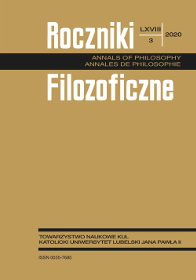How to Make a World
Abstrakt
Jak stworzyć świat
W tym eseju analizuję dwie modalności, dzięki którym można zrealizować złożona zadanie – nazywam je szczegółową kontrolą i celową przypadkowością. Rozważam, która z nich lepiej opisuje stworzenie przez Boga wszechświata, w świetle tego, co wiemy o stworzeniu na podstawie nauki. Badam również związek między tym zagadnieniem a poglądami na temat boskiej Opatrzności, w tym „otwartego teizmu probabilistycznego”, który proponuje Łukasiewicz.
Bibliografia
Behe, Michael J. Darwin’s Black Box: The Biochemical Challenge to Evolution. Downers Grove, IL: InterVarsity, 1996.
Bower, Bruce. “Hobbits died out earlier than thought.” Science News, April 30, 2016, 7.
Collins, Robin. “Divine Action and Evolution.” In The Oxford Handbook of Philosophical Theology, edited by Thomas P. Flint and Michael C. Rea. Oxford: Oxford University Press, 2009. doi:10.1093/oxfordhb/9780199596539.013.0012.
Harmon, Katherine. “Shattered Ancestry.” Scientific American, February 2013, 42–49.
Hasker, William. “The Need for a Bigger God.” In God in an Open Universe: Science Metaphysics, and Open Theism, edited by William Hasker, Thomas Jay Oord, and Dean Zimmerman, 15–29.
Eugene, OR: Pickwick Publications, 2011.
Hasker, William. “The Case for Emergent Dualism.” In The Blackwell Companion to Substance Dualism, edited by Jonathan J. Loose, Angus J. L. Menuge, and J. P. Moreland, 61–72. Oxford: Wiley–Blackwell, 2018. doi:10.1002/9781119468004.ch4.
Hasker, William. The Emergent Self. Ithaca, NY: Cornell University Press, 1999.
Hasker, William. “Can Eternity Be Saved? A Comment on Stump and Rogers.” International Journal for Philosophy of Religion 87 (2020): 137–48. doi:10.1007/s11153-019-09719-w.
Gould, Stephen J. Wonderful Life: The Burgess Shale and the Nature of History. New York: Norton, 1989.
Conway Morris, Simon. Life’s Solution: Inevitable Humans in a Lonely Universe. Cambridge: Cambridge University Press, 2003.
Conway Morris, Simon. The Crucible of Creation: The Burgess Shale and the Rise of Animals. Oxford: Oxford University Press, 1998.
Mullins, R. T. The End of the Timeless God. Oxford: Oxford University Press, 2016.
Plantinga, Alvin. “Response.” European Journal for Philosophy of Religion 5, no. 3 (Autumn 2013): 55–73. doi:10.24204/ejpr.v5i3.219.
Shubin, Neil H. “This Old Body.” Scientific American, February 2009, 64–67. doi:10.1038/scientificamerican0109-64.
Shubin, Neil H. Your Inner Fish: A Journey into the 3.5-Billion-Year History of the Human Body. New York: Pantheon, 2008.
Van Inwagen, Peter. “The Place of Chance in a World Sustained by God.” In God, Knowledge, and Mystery: Essays in Philosophical Theology by Peter van Inwagen. Ithaca, NY: Cornell University Press, 1995.
Wong, Kate. “Rethinking the Hobbits of Indonesia.” Scientific American, November 2009, 66–73.
Wong, Kate. “The Human Pedigree.” Scientific American, February 2009, 60–63.
Copyright (c) 2020 Roczniki Filozoficzne

Utwór dostępny jest na licencji Creative Commons Uznanie autorstwa – Użycie niekomercyjne – Bez utworów zależnych 4.0 Międzynarodowe.





